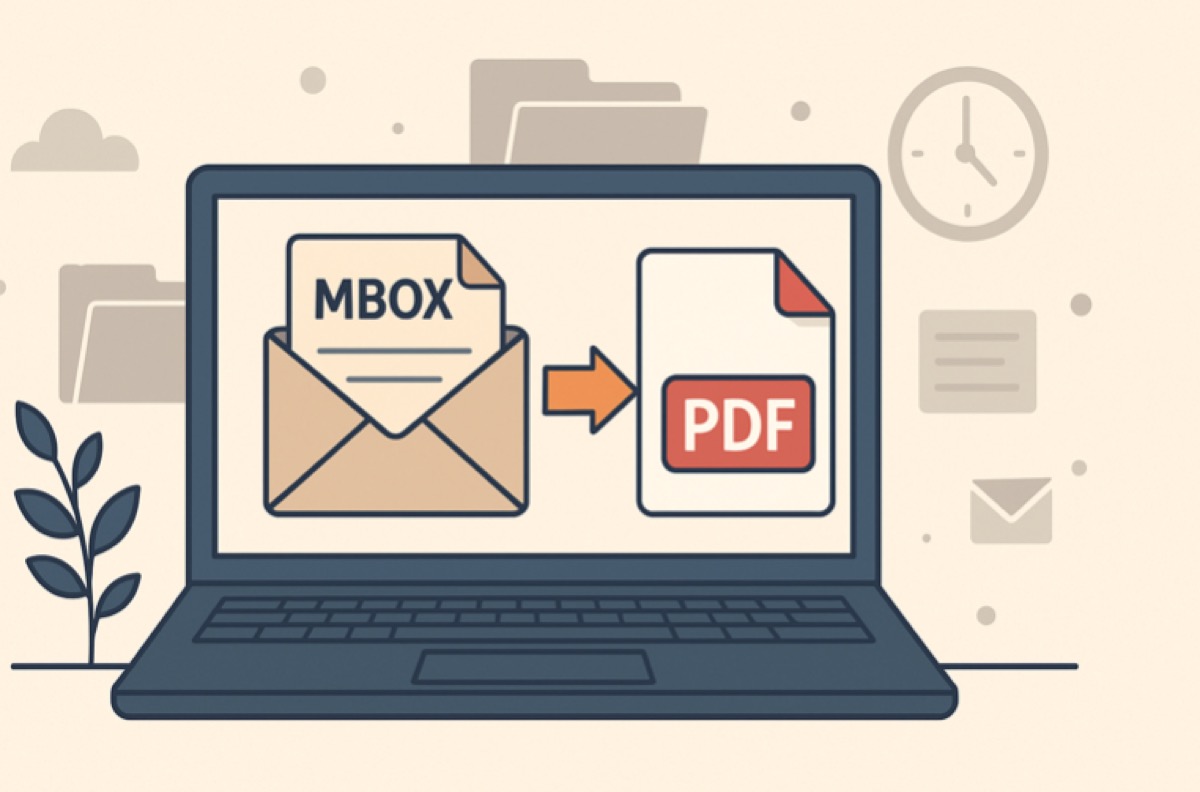Learn how to convert MBOX email files to PDF format for secure archiving, legal compliance, and easy sharing. Complete guide with best practices.
Email archiving has become a critical requirement for businesses and individuals who need to preserve important communications for legal compliance, audit purposes, and long-term storage. The MBOX format, widely used by email clients like Thunderbird and Apple Mail, stores multiple email messages in a single file but lacks the universal accessibility that modern document sharing requires. Solutions that convert mbox to pdf provide the perfect bridge between email storage and portable document sharing, ensuring your valuable communications remain accessible across all platforms and devices.
Understanding the importance of email conversion becomes crucial when organizations face regulatory requirements, legal discovery processes, or simply need to share email communications with stakeholders who may not have access to specialized email clients. PDF format offers unmatched compatibility and preserves the original formatting of email messages while ensuring they can be viewed on any device without additional software requirements.
Understanding MBOX Format and Its Applications
MBOX represents a family of mailbox formats originally developed for UNIX systems and standardized through RFC 4155, which defines the application/mbox media type. This format stores email messages as plain text in a concatenated sequence, with each message beginning with a “From ” separator line that includes sender information and timestamp data.
The format gained widespread adoption because of its simplicity and compatibility with various email clients. Today, MBOX files are commonly created when users export their email data from platforms like Gmail through Google Takeout, Mozilla Thunderbird backups, or Apple Mail archives.
Common Sources of MBOX Files
Modern email users encounter MBOX files in several scenarios:
- Gmail Data Export – Google Takeout creates MBOX archives when users download their email history
- Thunderbird Backups – Mozilla’s email client uses MBOX as its native storage format
- Apple Mail Archives – macOS Mail app exports data in MBOX format for backup purposes
- Email Migration – System administrators use MBOX files when transferring between email platforms
These files can contain thousands of messages with complete metadata, attachments, and formatting information, making them valuable repositories of communication history.
The Need for PDF Conversion in Email Management
Converting MBOX files to PDF format addresses several critical business and personal requirements that standalone email files cannot fulfill. Organizations operating under regulatory frameworks like HIPAA, SOX, or FINRA must maintain email records in formats that ensure long-term accessibility and tamper-proof storage.
Key Benefits of MBOX to PDF Conversion
Legal and compliance professionals particularly value PDF conversion because it creates standardized documents that can be easily reviewed, printed, and submitted as evidence in legal proceedings. Unlike proprietary email formats, PDF ensures that message content, headers, and timestamps remain visible regardless of the viewing software or operating system.
The conversion process also addresses practical sharing challenges. When organizations need to distribute email communications to external stakeholders, clients, or legal counsel, PDF format eliminates compatibility issues and ensures recipients can access the content without specialized software installation.
Business Applications for Converted Files
Professional scenarios where PDF conversion proves essential include:
- Legal Discovery – Courts and attorneys require email evidence in universally accessible formats
- Audit Compliance – Regulatory bodies expect standardized document formats for review processes
- Client Communications – Sharing email threads with customers or partners in professional format
- Archive Management – Long-term storage solutions benefit from PDF’s stability and compatibility
Technical Considerations for MBOX to PDF Conversion
Successful email-to-PDF conversion requires careful attention to data integrity and formatting preservation. Quality conversion tools must handle complex email structures including HTML content, embedded images, attachments, and multilingual character sets while maintaining the original message hierarchy and metadata.
The technical challenge lies in preserving essential email components during the transformation process. Professional conversion solutions must maintain sender/receiver information, timestamps, subject lines, and message threading while creating readable PDF documents that accurately represent the original communications.
Essential Features for Reliable Conversion
When evaluating conversion solutions, organizations should prioritize tools that offer comprehensive data preservation:
- Metadata Retention – Preserving sender, recipient, timestamp, and routing information
- Attachment Handling – Converting or embedding file attachments within the PDF structure
- Format Compatibility – Supporting various MBOX variants from different email clients
- Batch Processing – Converting multiple files or large archives efficiently
- Security Features – Protecting sensitive communications during the conversion process
Modern online conversion platforms have simplified the process significantly, allowing users to upload MBOX files and receive professionally formatted PDF documents without software installation or technical expertise.
Best Practices for Email Archive Conversion
Implementing effective email archiving strategies requires understanding both technical requirements and compliance obligations. Organizations should establish clear policies for email retention, conversion timing, and access controls before beginning large-scale archive projects.
The Adobe PDF format standardized as ISO 32000 provides excellent long-term preservation characteristics due to its open standard specification and widespread support across platforms. This makes PDF an ideal target format for organizations planning multi-decade archive retention strategies.
Recommended Conversion Workflow
Successfully managing email archive conversion involves systematic planning and execution:
- Audit Requirements – Identify legal, regulatory, and business requirements for email retention
- Organize Source Files – Categorize MBOX files by date, sender, or business function before conversion
- Test Conversion Quality – Verify that critical emails convert accurately with all metadata intact
- Implement Security Measures – Ensure conversion processes protect sensitive information appropriately
- Establish Access Controls – Define who can access converted archives and under what circumstances
Professional organizations often benefit from establishing regular conversion schedules that align with their email retention policies and compliance requirements.
Choosing the Right Conversion Solution
The email conversion landscape offers various approaches ranging from desktop software to cloud-based services, each with distinct advantages depending on organizational requirements. Online conversion platforms provide convenience and accessibility, while desktop solutions may offer enhanced security for sensitive communications.
When selecting conversion tools, organizations should evaluate factors including processing capacity, security features, format compatibility, and integration capabilities with existing document management systems. The ideal solution balances ease of use with robust feature sets that meet specific organizational requirements.
Key Selection Criteria
Effective conversion solutions should demonstrate:
- Processing Reliability – Consistent results across different MBOX file types and sizes
- Security Standards – Appropriate data protection during upload, processing, and download
- Format Accuracy – Faithful reproduction of original email formatting and structure
- Support Resources – Documentation and assistance for troubleshooting conversion issues
Organizations handling sensitive communications should prioritize solutions that offer on-premises processing capabilities or guarantee secure data handling practices that align with their security requirements and compliance obligations.
Converting MBOX files to PDF format represents a strategic approach to email management that addresses compliance, sharing, and long-term preservation requirements. By implementing systematic conversion processes and selecting appropriate tools, organizations can transform their email archives into accessible, professional documents that serve their business needs for years to come.


